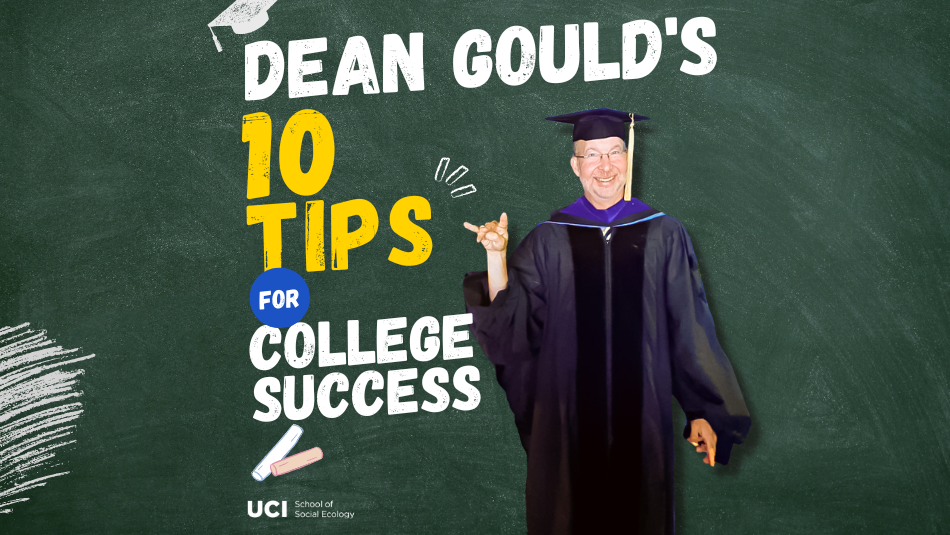
Author of How to Succeed in College provides sage advice
By Matt Coker
Earlier this year, Jon B. Gould became the fifth dean since the School of Social Ecology was founded in 1970. Among Dean Gould’s earlier career highlights: serving as the inaugural director of the Washington Institute for Public Affairs Research and chair of the Department of Justice, Law & Criminology at American University. While at the Washington, D.C., university in 2012, his book How to Succeed in College (While Really Trying): A Professor’s Inside Guide was published by University of Chicago Press.
What prompted the distinguished scholar, author, researcher, lawyer and government advisor to write a guide for baffled college students?
“This is actually kind of a funny story,” Gould says. “I had been teaching probably a decade at that point, and I had seen a lot: a lot of good and some bad. I was at a conference sitting on a bench way in the back with my editor from the University of Chicago, and we were chatting away and I was saying to him, ‘You know, I’m getting so frustrated with some students who have become their own worst enemies. If only they knew some of the secrets of college before they got to my classes, they would do so much better.’ ”
That soon led to a run through what Gould calls the “if only conversations.” He explains: “The if only conversations always happened at the end of the academic year, when a student who has not done well comes to see the professor, sits down and says, ‘If only I had not gone to so many parties’ or ‘If only this had not happened I would have really done well in your class.’ So many of those if onlys were like if only you knew how to study for the exam, if only you knew what we were looking for on the exams, if you knew how to plan your time, if you knew what classes to take, if you knew what major you should pursue. And my editor just looked at me and said, ‘You know, I think there’s a book in this.’ ”
As you begin your hunt for a copy, Dean Gould is sharing these 10 tips from his book:
- One of the first challenges you must recognize about college is that it’s up to you. If you go to class, if you do the reading and take notes, if you complete your assignments on time, then you are likely to prosper in college. But, no one is going to do it for you.
- College offers you many opportunities for study, but don’t let the choices paralyze you. Your initial task is to select classes that are interesting to you, that challenge you, and that will help you to identify potential fields for further exploration. There is no magic major or one right path.
- Don't be afraid to ask for help. Whether it's because a class is confusing, you're having difficulties in your personal life, or the transition to college is challenging, there are plenty of people here prepared to help you. Ultimately, we all want to see you succeed.
- Good instructors teach you how to think, not what to think. By extension, they expect you to explain your positions, not simply state them.
- We’re not looking for students to be certain, have all the answers, or see the world in black and white. The mark of an educated person is the ability to see the gray, appreciate nuance, and know the difference between a blustering assertion and a defensible position.
- Think of office hours as advanced tutoring, an opportunity to leverage your tuition for the kind of one-on-one dialogue and personal mentoring that is harder to achieve in a large classroom.
- If you’re ill for an extended amount of time or must miss class because of a family emergency, most professors will work with you to catch up in the course. But if you simply decided to skip class, the responsibility is yours to pick up on what you missed.
- Wikipedia has become the siren song for many college students and the bane for most professors’ existence. It simply cannot be relied upon for academic research, as there is little way of assessing the credibility of the material.
- The reality is that most of the papers you can purchase on the Internet are of fair-to-poor quality, meaning that your grade is likely to suffer even if your professor does not discover the plagiarism. (Note: It’s relatively easy for professors to discover it.) Doing your own work not only means you’ll actually learn the material, but you’ll likely do better in the course and not threaten your academic good standing.
- Even as I give this advice, I don’t want to worry you too much about life after college. There will be plenty of time to prepare for that. For now, concentrate on enjoying and getting the most out of college life, both in the classroom and in your extracurricular activities.
Dean Gould believes his colleagues in academia also can get something out of How to Succeed in College (While Really Trying).
“We can do a better job in the professoriate of providing students with a better understanding of what we are looking for in the classes and how they can get the most out of it. It was a wonderfully cathartic writing experience. It was the fastest book I’ve ever written.”
Related:
New dean is excited to tell the School of Social Ecology story